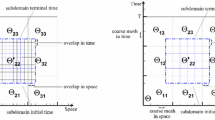Abstract
On the basis of overlapping domain decomposition, we construct a parallel least-square finite element algorithm (PLS) for solving the first-order time-dependent convection–diffusion system. The algorithm is fully parallel. At each time step, only one or two iterations are needed to reach to given accuracy. Some numerical results are reported to confirm the theoretical results.
Similar content being viewed by others
References
Bochev PB, Gunzburger MD (1995) Least-squares method for the velocity–pressure–stress formulation of the Stokes equations. Comput Methods Appl Mech Eng 126: 267–287
Cai Z, Lazarov R, Manteuffel TA, McCormick SF (1994) First-order least squares for second-order partial differential equations: Part I. SIAM J Numer Anal 31: 1785–1799
Carey GF, Pehlivanov AI, Vassilevski PS (1995) Least-squares mixed finite element method for non-selfadjoint elliptic problem. SIAM J Scientific Comput 16: 1126–1136
Chang CL (1987) A finite element method for first order elliptic system in three dimension. Appl Math Comput 23: 171–183
Chang CL (1990) A least-squares finite element method for the Helmholtz equation. Comput Methods Appl Mech Eng 83: 1–7
Chang CL, Gunzburger MD (1990) A subdomain-Galerkin/least square method for first order elliptic system in the plane. SIAM J Numer Anal 27: 1197–1211
Chang CL (1994) An error estimate of the least squares finite element method for Stokes problem in three dimension. Math Comput 207: 41–50
Chang CL, Yang SY, Hsu CH (1995) A least-squares finite element method for incompressible flow in stress–velocity–pressure version. Comput Methods Appl Mech Eng 128: 1–9
Jiang BN, Chang CL (1990) Least squares finite element for the Stokes problem. Comput Methods Appl Mech Eng 78: 297–311
Jiang BN, Povinelli LA (1990) Optimal least squares finite element method for elliptic problems. Comput Methods Appl Mech Eng 102: 199–212
Pehlivanov AI, Carey GF, Lazarov RD (1994) Least-squares mixed finite elements for second order elliptic problems. SIAM Numer Anal 31: 1368–1375
Pehlivanov AI, Carey GF (1994) Error estimate for least-squares mixed finite elements. RAIRO Model Math Numer Anal 28: 499–516
Yu ST, Jiang BN, Liu NS, Wu J (1995) The least-squares finite element method for low-Mach-number compressible viscous flows. Int J Numer Methods Fluids 38: 3591–3610
Hsieh PW, Yang SY (2009) On efficient least-squares finite element methods for convection-dominated problems. Comput Methods Appl Mech Eng 199: 183–196
Majidi M, Starke G (2001) Least-squares Galerkin methods for parabolic problems. I. Semidiscretization in time. SIAM J Numer Anal 39: 1302–1323
Majidi M, Starke G (2002) Least-squares Galerkin methods for parabolic problems. II. The fully discrete case and adaptive algorithms. SIAM J Numer Anal 39: 1648–1666
Rui H, Kim SD, Kim S (2009) Split least-squares Galerkin finite element methods for linear and nonlinear parabolic problems. J Comput Appl Math 223: 938–952
Jiang BN, Povinelli LA (1990) Least-squares finite element method for fluid dynamics. Comput Methods Appl Mech Eng 81: 13–37
Tang LQ, Tsang TTH (1993) A least-square finite element method for time-dependent incompressible flows with thermal convection. Int J Numer Methods Fluids 17: 271–289
Yang DP (1999) Some least-squares Garlerkin procedures for first-order time-dependent convection–diffusion system. Comput Methods Appl Mech Eng 180: 81–95
Yang DP (2000) Analysis of least-squares mixed finite element methods for nonlinear nonstationay convection–diffusion problems. Math Comput 69: 929–963
Yang DP (2002) Least-squares mixed finite element methods for non-linear parabolic problems. J Comput Math 20: 153–164
Bramble JH, Pasciak JE, Xu J (1990) Parallel multilevel preconditioners. Math Comput 55: 1–22
Bramble JH, Pasciak JE, Xu J (1991) Convergence estimates for product iterative methods with application to domain decomposition. Math Comput 57: 1–21
Cai XC (1994) Some domain decomposition algorithms for nonselfadjont elliptic and parabolic partial differential equations. SIAM J Sci Comput 15: 587–603
Dryja M, Widlund OB (1987) An additive variant of Schwarz alternating methods for many subregions, T ech Report 339 Dept of Comp Sci Coutant Institute
Lu T, Shih TM, Liem CB (1991) Two synchronous parallel algorithms for partial differential equations. J Comput Math 9: 74–85
Xu J (2001) The method of subspace corrections. J Comput Appl Math 128: 335–362
Xu J (1989) Theory of multilevel methods. PhD thesis, Cornell University
Xu J (1992) Iterative methods by space decomposition and subspace correction: a unifying approach. SIAM Rev 34: 581–613
Cai XC (1991) Additive Schwarz algorithms for parabolic convection–diffusion equations. Numer Math 60: 41–61
Cai XC (1994) Multiplicative Schwarz methods for parabolic problem. SIAM J Sci Comput 15: 587–603
Tai XC (1998) A space decomposition method for parabolic equations. Numer Methods Partial Differ Equ 14: 24–46
Rui H, Yang DP (1998) Schwarz type domain decomposition algorithms for parabolic equations and error estimates. Acta Math Appl Sinica 14: 300–313
Rui H, Yang DP (2001) Multiplicative Schwarz algorithm with time stepping along characteristics for convection diffusion equations. J Comput Math 19: 501–510
Adams RA (1975) Sobolev spaces. Academic Press, New York
Toselli A, Widlund O (2005) Domain decomposition methods—algorithms and theory. Springer, Berlin
Author information
Authors and Affiliations
Corresponding author
Additional information
Communicated by X. Chen.
This work was supported by the National Basic Research Program of P. R. China under the grant 2005CB321703 and the Research Fund for Doctoral Program of High Education by China State Education Ministry.
Rights and permissions
About this article
Cite this article
Zhang, J., Yang, D. Parallel least-squares finite element method for time-dependent convection–diffusion system. Computing 91, 217–240 (2011). https://doi.org/10.1007/s00607-010-0115-y
Received:
Accepted:
Published:
Issue Date:
DOI: https://doi.org/10.1007/s00607-010-0115-y
Keywords
- Domain decomposition
- Parallel subspace correction
- Least-squares
- Convection–diffusion system
- Convergence analysis




